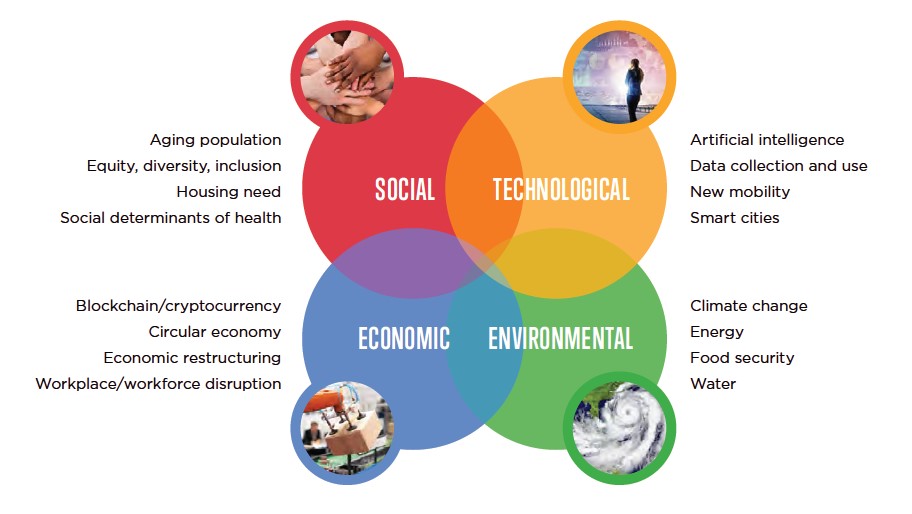
As the COVID-19 pandemic so starkly demonstrated, the 21st century is a time of accelerating change that is disrupting local communities and the lives of community members. The pandemic played out against a backdrop of long-term trends such as climate change, technological disruption, shifting demographics, and socioeconomic inequality. When faced with transformative change, the human tendency is to return to the “old normal” by reacting to the crisis of the moment rather than anticipating and preparing for what the future may bring. This raises a fundamental question for local governments: How can we shift to a more proactive, strategic, and flexible approach that accounts for the impacts of change? And how can this approach be operationalized in plans, programs, and day-to-day operations?
The Triangle J Council of Governments (TJCOG) is a regional planning organization in North Carolina whose local governmental members range from the cities of Raleigh and Durham to small towns and rural counties. The Triangle J region has strong assets, such as the Research Triangle Park, leading educational institutions, and abundant environmental and recreational amenities. At the same time, the region faces issues such as increasing socioeconomic disparities, climate change impacts, and the challenges and opportunities posed by emerging technologies.
TJCOG hosted a regional summit in late 2021 that focused on the disruptive impacts of change on its member communities. Building on the momentum generated by the summit, TJCOG retained Ben Hitchings, FAICP, principal of Green Heron Planning, LLC, and David Rouse, FAICP to research and write a report providing 1) information on key emerging issues and trends affecting the region and 2) potential short, mid, and long-term responses at the local and regional levels to prepare for the impacts. The Triangle Trends Report: Tracking Disruption is available on the TJCOG website.
The report is organized around the Drivers of Change framework developed by the authors. Drivers of change are macro issues and trends that are impacting regions and communities or will impact them in the future. The framework groups the drivers into four broad, interconnected categories: social, technological, economic, and environmental. For each category, four current or future drivers of change of particular relevance or interest to the Triangle J region were selected with TJCOG staff.

The report contains concise (two-page) briefs on each of the 16 drivers of change. Each brief begins with a macro-level overview of the driver of change; identifies other drivers to which it relates; explores implications for the Triangle J region and potential community and regional responses; and concludes with key statistics and references. Web links to references and resources of interest are provided for those who wish to delve more deeply into the topic. The report’s concluding section provides recommendations on next steps communities can take to increase their readiness for future change.
The Triangle Trends Report offers a resource that TJCOG and its members can use to prepare for change. It is designed to be a living document that can be modified and added to over time as new issues and trends arise. While focusing on the Triangle J region of North Carolina, the report provides a model that can be readily adapted to other regions and communities that are dealing with disruption caused by change. In a time when the world is literally changing before our eyes, we hope it will help communities and organizations evolve their mindsets from reacting to the crisis of the moment to proactively preparing for the shocks and stresses that the future will inevitably bring.
